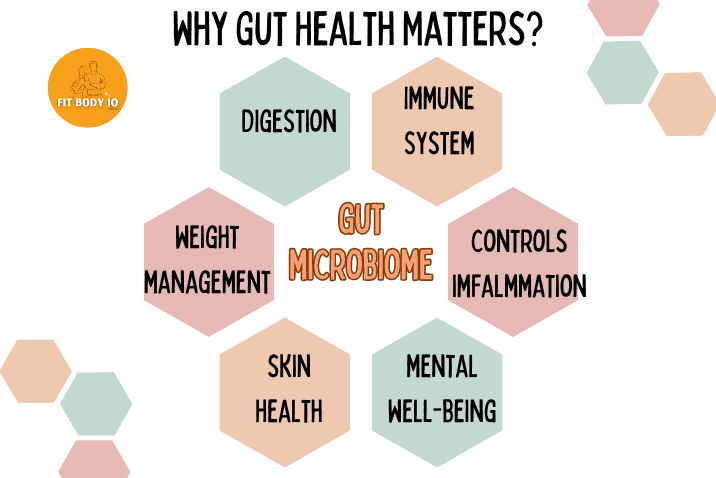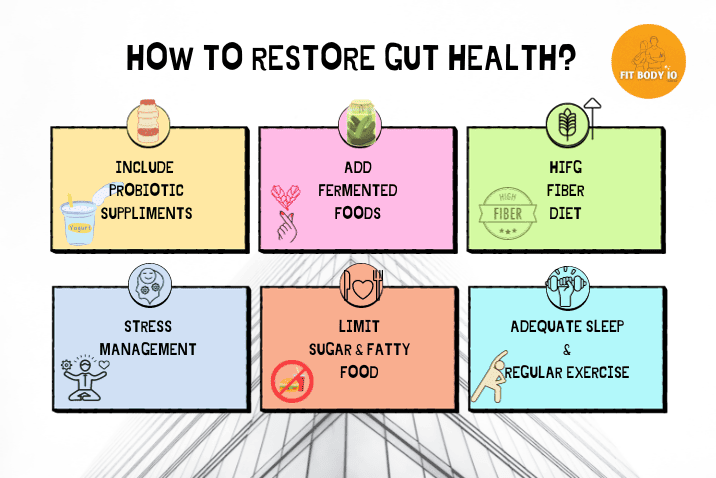
Antibiotics are powerful medications that have revolutionized the treatment of bacterial infections, saving countless lives. However, these drugs don’t discriminate; they not only target harmful bacteria but can also disrupt the balance of beneficial bacteria in your gut. This imbalance can lead to digestive issues, weakened immunity, and other health concerns. But the good news is that you can restore gut health after antibiotics with the right approach. In this comprehensive guide, we’ll explore the steps you can take to nurture your gut back to health.
Understanding the Gut Microbiome
The gut microbiome is a bustling community of microorganisms, including bacteria, viruses, and fungi, residing in your digestive tract. It’s a complex and dynamic ecosystem that plays a pivotal role in your overall health. Think of it as a miniature rainforest within your body, with trillions of inhabitants, each with its unique function.
These microorganisms work tirelessly to aid in digestion, extract nutrients, regulate the immune system, and even influence your mood and metabolism. Your gut microbiome is a key player in the intricate dance of maintaining your well-being, and nurturing its diversity and balance can have a profound impact on your health, from your immune function to your mental state.
Key Reasons Why Gut Health Matter

- Optimal Digestion
Your gut is where the magic of digestion happens. Enzymes and beneficial bacteria work together to break down food and extract essential nutrients, ensuring that your body receives the energy and building blocks it needs to function.
- Immune System Function
Your gut houses a significant portion of your immune cells. A healthy gut microbiome helps regulate immune responses and enhances your body’s ability to defend against harmful pathogens. An imbalanced gut can lead to immune dysfunction.
- Mental Well-Being
The gut-brain connection is a fascinating area of research. Emerging studies suggest that the health of your gut may influence your mood and cognitive function. An unhealthy gut could contribute to conditions like anxiety, depression, and stress.
- Weight Management
The composition of your gut bacteria can affect your metabolism and weight. A diverse and balanced microbiome may support healthy weight management, while an imbalanced gut could be associated with weight gain and obesity.
- Inflammation Control
Chronic inflammation is a root cause of many chronic diseases. A well-balanced gut microbiome helps regulate inflammation, preventing it from becoming chronic and harmful.
- Skin Health
The state of your gut may impact the condition of your skin. Skin issues such as acne, eczema, and psoriasis can be influenced by the gut microbiome. Improving gut health might translate to improved skin health.
- Allergies and Autoimmune Diseases
An imbalanced gut microbiome may increase the risk of allergies and autoimmune diseases. A healthy gut helps educate the immune system, reducing the likelihood of autoimmune responses or allergic reactions.
Antibiotics and Gut Health
While antibiotics are designed to target and eliminate harmful bacteria causing infections, they can’t distinguish between the good and bad bacteria in your gut. This collateral damage can disrupt the delicate balance of your gut microbiome, leading to a variety of issues.
Steps to Restore Gut Health After Antibiotics

- Finish the Antibiotic Course
Always complete the full course of antibiotics as prescribed by your healthcare provider. Stopping antibiotics prematurely can lead to antibiotic resistance and may not effectively treat the infection.
- Probiotic Supplements
Probiotic supplements are dietary supplements that contain live beneficial bacteria or yeasts. Probiotic supplements contain beneficial bacteria strains that can help replenish the populations of healthy gut bacteria. Look for probiotics with a variety of strains, including Lactobacillus and Bifidobacterium, and consult with a healthcare provider for guidance on selecting the right probiotic for your needs. You can read more on this topic and also how yogurt/curd is a natural probiotic in my previous blog on Superfoods where have explained in detail. To read more click probiotics.
- Fermented Foods
Incorporate fermented foods into your diet. These naturally contain probiotics that can aid in the restoration of your gut microbiome. Options include yogurt (with live and active cultures), kefir, sauerkraut, kimchi, miso, and kombucha.
- Prebiotic Foods
Prebiotics are foods that provide nourishment for your gut bacteria. Garlic, onions, leeks, asparagus, bananas, and whole grains are excellent sources of prebiotics.
- High-Fiber Diet
A diet rich in fiber supports gut health by promoting the growth of beneficial bacteria. Ensure that your meals include a variety of fruits, vegetables, legumes, and whole grains.
- Stay Hydrated
Proper hydration is essential for overall health, including gut health. Drinking plenty of water supports digestive processes and helps maintain a healthy gut lining.
- Limit Sugar and Processed Foods
Excessive sugar and processed foods can negatively impact your gut microbiome. Minimize your intake of sugary snacks and highly processed foods to support gut health.
- Stress Management
Chronic stress can affect gut health. Incorporate stress-reduction techniques such as meditation, yoga, deep breathing exercises, or engaging in hobbies that help you relax.
- Adequate Sleep
Aim for 7-9 hours of quality sleep per night. A regular sleep schedule positively influences your gut health and overall well-being.
- Regular Exercise
Physical activity can contribute to a healthy gut microbiome. Aim for at least 150 minutes of moderate-intensity exercise per week.
- Avoid Overuse of Antibiotics
Whenever possible, discuss alternative treatment options with your healthcare provider to avoid unnecessary antibiotic use.
- Consult a Healthcare Professional
If you continue to experience gut issues or other health concerns after completing a course of antibiotics, don’t hesitate to consult with a healthcare professional. They can provide personalized advice and may recommend further testing or interventions.
Types of probiotic Supplements
Probiotic supplements come in various formulations, each containing different strains of beneficial bacteria. The choice of a probiotic supplement depends on your specific health needs and goals. Here’s a list of some commonly used probiotic strains and their potential benefits:
- Lactobacillus acidophilus: Supports digestive health, alleviates lactose intolerance, and may help with diarrhea.
- Bifidobacterium bifidum: Aids in digestion and supports a balanced gut microbiome.
- Lactobacillus casei: Promotes gut health, may help with irritable bowel syndrome (IBS), and supports the immune system.
- Bifidobacterium longum: Supports digestive health and helps maintain a balanced gut microbiome.
- Lactobacillus plantarum: Promotes gut health, supports immune function, and may reduce inflammation.
- Lactobacillus rhamnosus: Supports digestive health, may help with diarrhea, and supports the immune system.
- Bifidobacterium breve: Aids in digestion and may help with constipation and diarrhea.
- Saccharomyces boulardii: A non-bacterial yeast probiotic that supports gut health and may help with diarrhea, particularly related to antibiotic use.
- Streptococcus thermophilus: Supports digestive health and may help with lactose intolerance.
- Lactobacillus gasseri: May support weight management and reduce abdominal fat.
- Bifidobacterium infantis: Supports digestive health and may help with IBS symptoms.
- Lactobacillus GG (LGG): Known for its immune-supporting properties and beneficial effects on gut health.
It’s important to note that the effectiveness of a probiotic supplement depends not only on the strain but also on factors like the dosage, the specific health condition you’re addressing, and individual factors. Therefore, it’s advisable to consult with a healthcare professional or a registered dietitian before starting any probiotic regimen to determine which strains and dosages are most suitable for your needs. Additionally, the quality and reputation of the brand should be considered when choosing a probiotic supplement.
Restoring gut health after antibiotics is a journey that requires patience and commitment to healthy habits. The balance of your gut microbiome can take weeks or even months to fully recover. However, by following the steps outlined in this guide, you can nurture your gut back to health and promote overall well-being. Your gut plays a vital role in your health, and taking care of it is a valuable investment in your long-term vitality.
